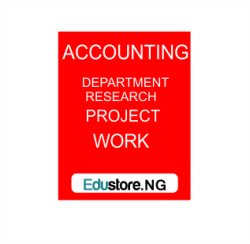COST ACCOUNTING INFORMATION IN MANAGEMENT DECISION MAKING
(A CASE STUDY OF NIGERIAN NATIONAL PETROLEUM CORPORATION – NNPC BENIN CITY)
ABSTRACT
This project research work attempts to explain the Cost Accounting Information as an aid to decision making in an organization using Nigerian National Petroleum Corporation (NNPC), Benin-Asaba Road, Benin City as a case study. Cost Accounting Information is designed for managers, since managers are taking decisions based on the existing cost accounting information. The important principle is that the Cost Accounting Information must be relevant for decision making. However, Generating Cost Accounting Information in an organization is not an easy task. The process of cost accounting itself is so complex. This is why cost accounting system is applicable only to a large-sized business. This is why the researcher made use of Nigerian National Petroleum Corporation (NNPC) as a case study. Chapter one of this project research work focuses on Background of the Study, Statement of the Problems, Objective of the Study, Significance of the Study, Limitation of the Study, Scope of the Study and Definition of Terms. Chapter two is on Literature review on Cost Accounting Information and such questions as what is Accounting, who is an Accountant? What is Cost Accounting? Scope of cost accountancy, Nature of cost accounting, Relationship between Financial accounting and Cost accounting, Purposes or Objects of cost accounts, Functions of cost accountant, Advantages of cost accounting, Cost Accounting Information, the benefits of cost accounting information, managerial cost accounting etc. Chapter three deals generally on Research Methodology, Chapter four purely deals on data analysis and interpretation with the findings. While Chapter five focuses on Summary of Finding, Conclusion and Recommendation.
TABLE OF CONTENT
Content Page
Title Page ii
Approval Page iii
Dedication iv
Acknowledgement v
Abstract vi
Table of content vii
CHAPTER ONE
1.0 Background of the study 1
1.1 Profile of Nigerian National Petroleum Corporation (NNPC) 2
1.2 NNPC organizational structure 3
1.3 Statement of the problem 3
1.4 Research question 6
1.5 Research hypothesis 7
1.6 Significance of the study 7
1.7 Scope of the study 8
1.8 Limitation of the study 8
1.9 Definition of terms 9
CHAPTER TWO
LITERATURE REVIEW
2.0 What is accounting? 11
2.1 Who is an accountant? 11
2.2 What is cost accounting? 12
2.3 Other definition of cost accountancy 14
2.4 Scope of cost accountancy 15
2.5 The nature of cost accounting 19
2.6 Relationship between financial accounting and cost accounting 21
2.7 Purposes or objectives of cost accounts 22
2.8 Functions of cost accountant 25
2.9 Advantages of cost accounting 27
2.10 Cost accounting information 30
2.11 The benefits of Cost Accounting Information 31
2.12 What is managerial cost accounting (MCA)? 33
2.13 Managerial cost accounting definition 33
2.14 The benefits of improved MCA information 34
2.15 The role of accountant in ensuring decision making 35
2.16 Ways in which Cost Accounting Information affect
negatively the decision of managers in the business
environment 40
2.17 The problems accountant face in generating cost accounting
information 41
2.19 Relating the remedies to the objective of the study 46
CHAPTER THREE
RESEARCH METHODOLOGY
3.0 Methodology 48
3.1 Area of the study 48
3.2 Population of the study 49
3.3 Sample size and sample techniques 49
3.4 Method of data collection 49
3.5 Method of data analysis 51
CHAPTER FOUR
4.0 DATA PRESENTATION AND ANALYSIS 53
4.1 Presentation of data 53
4.2 Research questions 54
4.3 Test of hypothesis 64
4.4 Discussion of findings 70
CHAPTER FIVE
5.0 Summary, conclusion and recommendation 71
5.1 Statement of the problem 71
5.2 Summary of finding 72
5.3 Conclusion 73
5.4 Recommendation 75
5.5 Suggestion for further study 76
References 77
Appendix 1 79
Appendix 2 80
CHAPTER ONE
INTRODUCTION
1.0 BACKGROUND OF THE STUDY
Cost Accounting Information helps Management in making suitable decisions such as to make or buy, replace manual labour by machines, shut down or continue operations based on cost reports. (Vishnani, Shah 2008).
In the modern business world, the nature and functioning of business Organizations have become very complicated. They have to serve the needs of variety of parties who are interested in the functioning of the business. These parties constitute the Owners, Creditors, Employees, Government agencies, Tax authorities, Prospective Investors, and last but not the least the Management of the business. The business has to serve the needs of this different category of people by way of supplying various information from time to time. In order to satisfy the needs of these group of people a sound Organization of accounting system is very essential.
In the ancient days the information required by those who were interested in the business Organization was met by practicing a system of accounting known as financial accounting system. Financial accounting is mainly concerned with preparation of two important statements, viz., income statement (or profit & loss account) and positional statement (or Balance Sheet). This information served the needs of all those who are not directly associated with Management of business. Thus financial accounts are concerned with external reporting as it provides information to external authorities. But Management of every business Organization is interested to know much more than the usual information supplied to outsiders.
In order to carry out its functions of planning, decision-making and control, it requires additional cost data. The financial accounts to some extent fail to provide required cost data to Management and hence a new system of accounting which could provide internal report to Management was conceived.
Accounting plays a significant role within the concept of generating and communicating wealth of the companies.
Cost Accounting Information is designed for managers. Since managers takes decisions for their own Organization, there is no need for the information to be comparable to similar information from other Organizations. Instead, the important criterion is that the information must be relevant for decisions that managers operating in a particular environment of business including strategy make.
1.1 PROFILE OF NIGERIAN NATIONAL PETROLEUM CORPORATION (NNPC)
The Nigerian National Petroleum Corporation (NNPC) is the oil corporation through which the Federal Government of Nigeria regulates and participates in the country’s petroleum industry.
NNPC was established on April 1, 1977 as a merger of the Nigerian National Oil Corporation and the Federal Ministry of Mines and Steel. NNPC by law manages the joint venture between the Nigerian Federal Government and a number of foreign multinational corporations, which include Royal Dutch Shell, Agip, ExxonMobil, Chevron, and Texaco. Through collaboration with these companies, the Nigerian government conducts petroleum exploration and production.
The NNPC Towers in Abuja is the Headquarters of NNPC. Consisting of four identical towers, the complex is located on Herbert Macaulay Way, Central Business District Abuja. NNPC also has zonal offices in Lagos, Kaduna, Port Harcourt and Warri. It has an international office located in London, United Kingdom. (The Economist Newspaper Limited, 2007-09-29).
1.2 NNPC ORGANIZATIONAL STRUCTURE
The Group Managing Director of the NNPC is Dr. Mohammed Sanusi Barkindo.
The NNPC Group is a very big and complex Organization which comprises of the NNPC Board, the Group Managing Director’s office. The NNPC Group is divided into eight major arms called directorates which are headed by a Group Executive Director (GED) whom are a step below the Group Managing Director (GMD). The Directorates are also Sub-Divided into Several Divisions and Subsidiaries which are headed by Group General Managers (GGM) and Managing Directors (MD), respectively. The NNPC has two partly owned subsidiaries and 16 associated companies.
1.3 STATEMENT OF THE PROBLEM
The major problem that prompts the researcher to embark on this project is that, most Organizations in Nigeria under estimate the potentials and the relevance of Cost Accounting Information as regards to decision making in their Organizations. Some Organizations think Cost Accounting process is too complex, as its system involves number of steps in ascertaining cost such as collection and classification of expenses, allocation and apportionment of expenses. These Organizations considered it to be complicated system of accounts. The researcher therefore decided to research on the topic so that:
1. To establish that there is a relationship between Cost Accounting Information and decision making.
2. The Cost Accounting Information require to make decision should be adequate and accurate.
3. The Business owner that require maximum return on their investment will be satisfied because of the gain in understanding Cost Accounting Information in decision making
1.4 OBJECTIVES OF THE STUDY
The objective of this study is:
1. To examine the relevance of Cost Accounting Information on Management decisions making. The researcher decided to establish this using NNPC as a case study for proper understanding.
2. To assess the relevance and functions of Cost Accounting Information.
3. To explain how Cost Accounting Information has helped in most Organizations in decision making process.
4. Also, to examine how Cost Accounting Information is relevant to the Management, the creditor, the employees, the investors and the government.
1.5 RESEARCH QUESTION
The researcher postulates some questions to test whether there is a significant relationship between the variables in the research topic, they are:
1. Is there any significant relationship between Cost Accounting Information and decision making process in Organizations?
2. Does the decision of the manager as well as the Management depend on the available Cost Accounting Information?
3. Are the available Cost Accounting Information in NNPC so reliable in such a way that Management have confidence in it why making decisions?
4. Will Management find it difficult to make proper decisions without confidence in Cost Accounting Information in an Organization?
5. Is it true that some managers in Organizations still do not fully know the relevance of Cost Accounting in decision making process?
6. Will creating awareness on the relevance of Cost Accounting Information to decision making enhance decision making in any Organization?
1.6 RESEARCH HYPOTHESIS
Based on the foregoing, the following research hypotheses formulated will be empirically tested and result gotten will serve as a spring board for recommendations. There is however no relationship existing between the Null hypothesis and the Alternative hypothesis. These are as follows:
Ho: There is no significant relationship between Cost Accounting Information and decision making process in Organizations
Hi: There are significant relationships between Cost Accounting Information and decision making process in Organizations
Ho: The decision of the managers as well as the Management does not depend on the available Cost Accounting Information.
Hi: The decision of the managers as well as the Management in an Organization depends on the available Cost Accounting Information.
1.7 SIGNIFICANCE OF THE STUDY
The researcher now discovered that it will be reasonable to encourage Management in Organizations to introduce a proper and vital Cost Accounting Information generating system because Cost Accounting Information helps Management in making suitable decisions such as to make or buy, replace manual labour by machines, shut down or continue operations based on cost reports. Without confidence in Cost Accounting Information as a whole, the Management will encounter difficulties in decision making process. Therefore, this research work will be useful to Management in Organizations as regards improving on standard of Cost Accounting Information in the Organization in which they operate.
Also, this research work will be useful to accounting students as well as other Management students as it will give students the basic insight of Cost Accounting procedures as well as Cost Accounting Information as an aid for decision making in an Organization.
1.8 SCOPE OF THE STUDY
This research project basically covers such area as Cost Accounting, Cost Accounting Information, the functions of Cost Accounting, the relevance of Cost Accounting Information etc, its relevance to the Management in Organizations in the area of business, cost, pricing and investment decision making. The area covered in the research work is limited to Nigerian National Petroleum Corporation (NNPC), Benin–Asaba Road Deport, Benin City.
1.9 LIMITATION OF THE STUDY
During the conduct of this research work, some factors posed as constraints to the determined efforts of the research to carryout the research study to such a depth and in such a manner that it ought to have been carried out judging from its relevance to Management, such factors include:
a. Management Restriction: Management more often than now allow access to information that are considered very confidential in nature like detail information of the Organizational corporate profile. As a result of the restrictions the researcher was able to work with only the information that was accessible.
b. Time Constraint: Time is also another factor that acts as hindrances in carrying out this research study. This is as a result of the fact that other things were still being attended to in the course of carrying out this research work.
c. Financial Constraint: Money also acts as a problem in the conduct of the research work. Traveling expenses were incurred in getting the materials for the research work. Also incurred, were expenses for the typing and distribution, building and a lot of other expenses.
1.10 DEFINITION OF TERMS
Cost Accounting
A type of accounting process that aims to capture a company’s costs of production by assessing the input costs of each step of production as well as fixed costs such as depreciation of capital equipment.
Accounting Information System – An accounting information system (AIS) is a system of collection, storage and processing of financial and accounting data that is used by decision makers.
Ethnics – Rules, principles or order governing a profession.
Leader – Person in authority (Head of an Organization).
Management – The art of running and controlling a business or similar Organization. According to Fubara (1986) views Management as an activity carried on in an environment that comprise of resources in capital and human, having alternative uses.
Dishonesty – Lack of trust and intending to deceive people.
Measure – Steps, methods to control situation.
DOWNLOAD COMPLETE WORK- For Reference Only: Materials are for research, citation, and idea generation purposes and not for submission as your original final year project work.
- Avoid Plagiarism: Do not copy or submit this content as your own project. Doing so may result in academic consequences.
- Use as a Framework: This complete project research material should guide the development of your own final year project work.
- Academic Access: This platform is designed to reduce the stress of visiting school libraries by providing easy access to research materials.
- Institutional Support: Tertiary institutions encourage the review of previous academic works such as journals and theses.
- Open Education: The site is maintained through paid subscriptions to continue offering open access educational resources.






